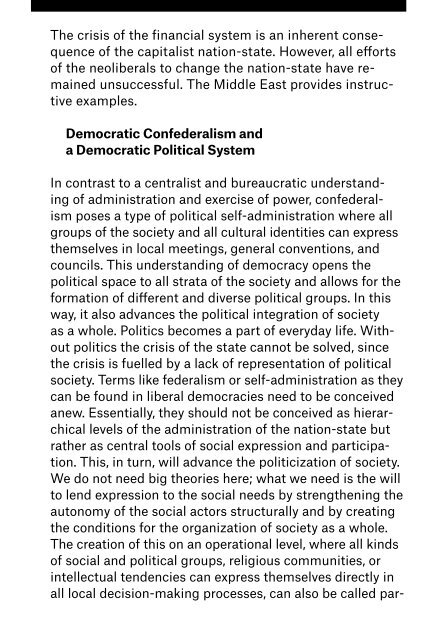Stateless Democracy
NWA5-Stateless-Democracy1.pdf?utm_content=buffer7beda&utm_medium=social&utm_source=twitter
NWA5-Stateless-Democracy1.pdf?utm_content=buffer7beda&utm_medium=social&utm_source=twitter
Create successful ePaper yourself
Turn your PDF publications into a flip-book with our unique Google optimized e-Paper software.
The crisis of the financial system is an inherent consequence<br />
of the capitalist nation-state. However, all efforts<br />
of the neoliberals to change the nation-state have remained<br />
unsuccessful. The Middle East provides instructive<br />
examples.<br />
Democratic Confederalism and<br />
a Democratic Political System<br />
In contrast to a centralist and bureaucratic understanding<br />
of administration and exercise of power, confederalism<br />
poses a type of political self-administration where all<br />
groups of the society and all cultural identities can express<br />
themselves in local meetings, general conventions, and<br />
councils. This understanding of democracy opens the<br />
political space to all strata of the society and allows for the<br />
formation of different and diverse political groups. In this<br />
way, it also advances the political integration of society<br />
as a whole. Politics becomes a part of everyday life. Without<br />
politics the crisis of the state cannot be solved, since<br />
the crisis is fuelled by a lack of representation of political<br />
society. Terms like federalism or self-administration as they<br />
can be found in liberal democracies need to be conceived<br />
anew. Essentially, they should not be conceived as hierarchical<br />
levels of the administration of the nation-state but<br />
rather as central tools of social expression and participation.<br />
This, in turn, will advance the politicization of society.<br />
We do not need big theories here; what we need is the will<br />
to lend expression to the social needs by strengthening the<br />
autonomy of the social actors structurally and by creating<br />
the conditions for the organization of society as a whole.<br />
The creation of this on an operational level, where all kinds<br />
of social and political groups, religious communities, or<br />
intellectual tendencies can express themselves directly in<br />
all local decision-making processes, can also be called participatory<br />
democracy. The stronger the participation, the<br />
more powerful this kind of democracy is. While the nationstate<br />
stands in contrast to democracy, and even denies it,<br />
democratic confederalism constitutes a continuous democratic<br />
process.<br />
Social actors, each comprising in themselves federative<br />
units, are the germ cells of participatory democracy. They<br />
can combine and associate into new groups and confederations<br />
according to a given situation. Each of the political<br />
units involved in participatory democracy is essentially<br />
democratic. In this way, what we call democracy is the<br />
application of democratic processes of decision-making<br />
from the local level to the global level in the framework of<br />
a continuous political process. This process will affect the<br />
structure of the social web of the society in contrast to the<br />
striving for homogeneity of the nation-state, a construct<br />
that can only be realized by force and thus brings about the<br />
very loss of freedom.<br />
I have already addressed the point that the local level is<br />
the level where decisions are made. However, the thinking<br />
leading to these decisions needs to be in line with global<br />
issues. We need to become aware of the fact that even<br />
villages and urban neighborhoods require confederate<br />
structures. All areas of society need to be given to selfadministration,<br />
all levels of it need to be free to participate.<br />
Democratic Confederalism and Self-Defense<br />
Essentially, the nation-state is a militarily structured entity.<br />
Nation-states are eventually the products of all kinds of<br />
internal and external warfare. None of the existing nationstates<br />
has come into existence all by itself. Invariably, they<br />
have a record of wars. This process is not limited to their<br />
founding phase but, rather, it builds on the militarization of<br />
the entire society. The civil leadership of the state is only<br />
102–103


